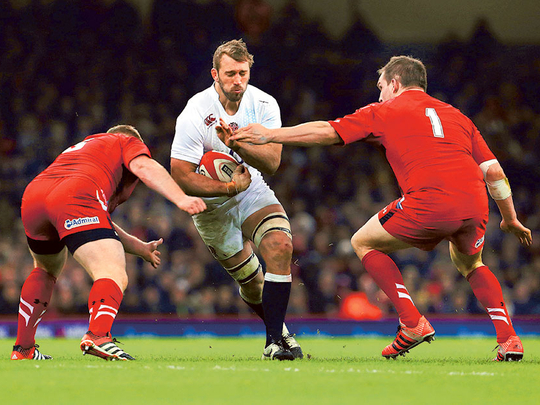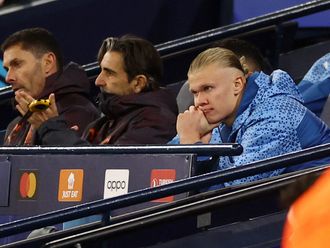
London: Chris Robshaw is now almost certain to lead England into the 2015 Rugby World Cup, says Stuart Lancaster, the head coach.
Lancaster usually delays nominating his captain until the start of each block of games, but in the wake of what many consider to be a seminal English win in Cardiff, he was moved publicly to declare his faith in his captain right through to the World Cup, which begins in September.
It was a significant endorsement.
“It would take a big change of heart now to move from the direction we are going with Chris,” Lancaster said as England began their preparations for the match against Italy at Twickenham on Saturday.
“Chris has been excellent and we need to continue to back him. We certainly will in this Six Nations and, fingers crossed, he will be fit and available for June [the World Cup training camp].”
The Harlequins flanker has been Lancaster’s preferred man since he took over the reins of English rugby three years ago, missing only a couple of matches through injury and unavailability.
Lancaster has always made a point that players have to earn their place in the team, and that is one reason why he has never made a long-term commitment to a particular captain. It is clear, though, that he trusts Robshaw to deliver as an openside flanker, even though there have been times when the coach has had to defend him against claims that he is a hybrid rather than a pure No. 7.
The clamour to recall Toulon’s Steffon Armitage has often been based on the notion that he would be more productive at the breakdown. Robshaw has stilled that debate, as might have Armitage’s own actions — he was due in court in France on Tuesday to decide if he is to be charged over an alleged assault in December.
In Lancaster’s eyes, Robshaw stacks up first and foremost as an openside. “Confidence in his ability as a player is the fundamental thing behind leadership,” the head coach said.
“You have got to be secure of your place in the team. Chris has been excellent. He has earned [that status] on a weekly basis. He did it again against Wales with the number of tackles and turnovers he made and his contribution to the game.
“We look at people’s involvement, not just in the rucks but in their workrate off the ball. Chris is continually at the top of that as well. He has earned the respect of the players and they back him to the hilt.”
Lancaster acknowledged that Robshaw would not have had the confidence to take the stance he did in the Millennium Stadium tunnel on Friday night — when he told his team to wait after being asked to take the field ahead of their opponents — in his first match as England captain three years ago, and nor would the head coach himself have had the self-assurance to defy local convention.
“It is not a decision I would have encouraged him to take in my first match in charge,” Lancaster said. “It does take time to find your feet. But we have grown as a group. We now have that confidence, we have players who have experienced big games. That investment in the last two or three years is beginning to tell.”
England also set great store in spreading the load of leadership and, even though Lancaster agreed that having a figurehead as captain was important, more significant still was the leadership package in a team.
“The captain is still an important person but the captain as iconic leader is not how it works in rugby. You have leaders across the field and our strength is in the collective. Chris represents that collective and he does it brilliantly. But he is backed up by some pretty strong foot soldiers, which is what we want.
“If you go back to the 2003 team, where you had Martin Johnson as captain, but there was also Lawrence Dallaglio, Neil Back, Richard Hill and other guys in that category. I’d like to think we have that type of group growing together. We have told the players it is their team, so they need to push and drive it.”
Lancaster pointed to the contributions made by the likes of the scrum-half Ben Youngs and flanker James Haskell, both of whom are club captains, as well as the growing influence of the full-back Mike Brown, who was to the fore in the tunnel stand-off.
Lancaster prefers to judge his players by what they do on the field. He certainly expects these characters to step up over the next few days as England guard against complacency.
“It is less about the tunnel and more about playing hard on the field. Mike has matured and is setting the benchmark for others. The win over Wales won’t count for much if we don’t back it up. The belief we had in Cardiff came from the work we had done beforehand. It is the same this week. There will be no letting up.”
— The Telegraph Group Limited, London 2015








